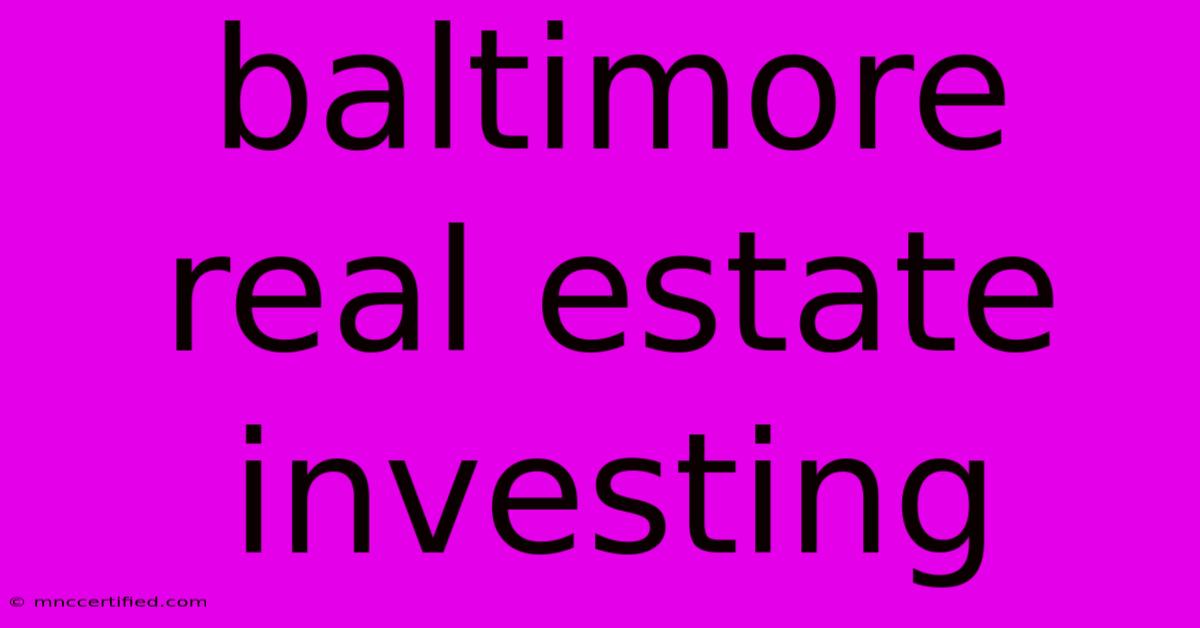Baltimore Real Estate Investing

Table of Contents
Baltimore Real Estate Investing: A Smart Move in a Thriving Market
Baltimore, Maryland, presents a compelling opportunity for real estate investors. With a rich history, vibrant culture, and a steadily growing economy, the city offers a diverse range of investment properties, from charming rowhouses to modern condos. This guide delves into the key aspects of Baltimore real estate investing, helping you navigate the market and make informed decisions.
Why Invest in Baltimore Real Estate?
Baltimore's real estate market boasts several attractive features that make it an appealing investment destination:
-
Relatively Affordable Prices: Compared to major coastal cities, Baltimore offers relatively lower property prices, presenting a higher return on investment (ROI) potential. This affordability extends to both residential and commercial properties.
-
Strong Rental Demand: Baltimore has a significant rental market, driven by a growing population, a diverse job market, and a large student population. This translates into consistent rental income for investors.
-
Government Initiatives: The city actively works on revitalization projects, attracting new residents and businesses, further boosting property values. These initiatives improve infrastructure and increase overall desirability.
-
Diverse Property Types: From historic brownstones to renovated lofts and new constructions, Baltimore offers a wide array of property types catering to different investor preferences and budgets. This diversity allows for varied investment strategies.
-
Growing Economy: Baltimore's economy is diversified, encompassing sectors like healthcare, education, and tourism, creating a stable foundation for real estate investment.
Types of Baltimore Real Estate Investments
Several investment avenues exist within the Baltimore real estate market:
-
Single-Family Homes: These offer potential for both rental income and appreciation. They are ideal for long-term investment strategies.
-
Multi-Family Properties: Investing in duplexes, triplexes, or larger apartment buildings provides increased rental income and potential for economies of scale.
-
Commercial Real Estate: This sector includes retail spaces, office buildings, and industrial properties, offering high potential returns but typically requiring larger capital investments and more specialized knowledge.
-
REITs (Real Estate Investment Trusts): For investors seeking diversification and less hands-on management, REITs offer exposure to the Baltimore real estate market without direct property ownership.
Analyzing the Baltimore Real Estate Market
Before investing, thorough market research is crucial. Consider these factors:
-
Neighborhood Analysis: Research different neighborhoods, focusing on crime rates, school districts, and proximity to amenities. Key neighborhoods to consider include Federal Hill, Canton, Mount Vernon, and Hampden.
-
Property Values and Appreciation: Analyze historical property value trends and projected future growth to assess potential ROI.
-
Rental Rates and Vacancy Rates: Understanding current rental rates and vacancy rates in the chosen neighborhood is essential for projecting rental income.
-
Property Taxes and Insurance Costs: Factor in these recurring expenses when evaluating the overall profitability of an investment property.
-
Competition: Assess the level of competition from other investors in the target area.
Finding and Evaluating Investment Properties
Finding the right property is key to a successful investment. Utilize these resources:
-
Real Estate Agents: Experienced agents specializing in investment properties can provide valuable market insights and assist in the buying process.
-
Online Listings: Websites like Zillow, Realtor.com, and Trulia offer access to a wide range of properties.
-
Networking: Connecting with other investors and real estate professionals can lead to off-market opportunities.
Once you've identified potential properties, conduct a thorough due diligence process:
-
Property Inspection: Hire a qualified inspector to identify any potential repairs or issues.
-
Financial Analysis: Create a detailed financial model to project potential ROI, considering all costs and expenses.
-
Legal Review: Consult with a real estate attorney to review the purchase agreement and ensure a smooth transaction.
Managing Your Baltimore Real Estate Investment
Successful long-term investment requires diligent management:
-
Tenant Management: Screen tenants carefully, handle lease agreements effectively, and address maintenance requests promptly. Consider professional property management services for larger properties.
-
Maintenance and Repairs: Regular maintenance prevents costly repairs down the line. Establish a maintenance budget and address issues promptly.
-
Financial Planning: Track your income and expenses meticulously, reinvesting profits strategically.
Conclusion: Seizing Baltimore's Real Estate Opportunities
Baltimore presents a dynamic and promising market for real estate investors. By conducting thorough research, carefully evaluating properties, and implementing effective management strategies, you can capitalize on the city's growth and achieve significant financial returns. Remember, professional advice from real estate agents, lawyers, and financial advisors is crucial for navigating the complexities of the market and maximizing your investment success. Start your research today and unlock the potential of Baltimore real estate!

Thank you for visiting our website wich cover about Baltimore Real Estate Investing. We hope the information provided has been useful to you. Feel free to contact us if you have any questions or need further assistance. See you next time and dont miss to bookmark.
Featured Posts
-
Can You Switch Insurance Agents
Nov 26, 2024
-
November 24 History Hijackers Long Search
Nov 26, 2024
-
Egypt Nile Cruise Ancient Sites
Nov 26, 2024
-
Investing In You Everfi Answers
Nov 26, 2024
-
Insurance For Basketball League
Nov 26, 2024